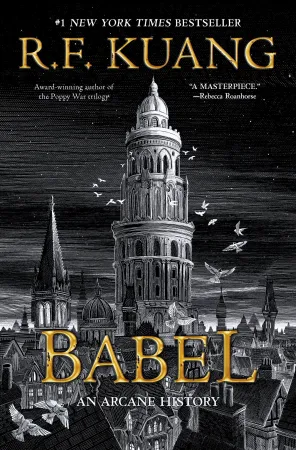Babel Book Summary

The protagonist of Babel, Robin Swift, tells the story virtually entirely. Robin Swift was brought to London by the enigmatic Professor Lovell in 1828, following the deaths of his surviving relatives for cholera. Professor Lovell brought Robin to teach him Latin, Ancient Greek, and Chinese even though Chinese is his natural tongue. Preparing him for his impending admission to Oxford University's prestigious Royal Institute of Translation, or Babel, was the aim. Babel is the epicentre of translation and, more importantly, global silversmithing. Silverworking is the art of physically creating an enchanted outcome by physically communicating the meaning that is lost in translation using charmed silver bars.
The storyline
Thanks to its silver production, the British Empire has become unrivalled in power, and Babel's study of foreign languages aids the Empire in its objective of controlling everything it encounters. The city of dreaming spires, Oxford, is like stepping into a storybook for Robin. Accurate information is key in this scenario, and one's degree of power is proportional to their degree of understanding. But this would likely necessitate him abandoning his native nation in favour of Robin, a Chinese boy brought up in Britain. After much deliberation, Robin must decide whether to remain in Babel and pursue his scholastic aspirations or to join the enigmatic Hermes Society, which is hostile to Babel and hell-bent on destroying the silver-working town.
Language, translation, racism, colonialism, the necessity of violence, and the need for a place to call home are just a few of the key issues explored in Babel. Those issues are arguably hinted at enough in the novel's title and concept on their own. Robin Swift and the other characters are among of Babel's finest features. Kuang painstakingly introduced and developed Robin Swift within the constraints of a single novel, which was less than seven hundred pages long. It appeared that both the story and his character were undergoing substantial development.
Time can change everything and everyone
If you remember the beginning of the novel, you will be able to discern how much Robin Swift has changed by the time you reach the end of the book. Plus, his character development was always organic. His whole range of feelings—from melancholy to rage to anxiety to issues to kindness to brief moments of joy—came across as authentic.
The group received a taste of what they could expect once their time at Babel ended as they started their fieldwork and flew to China to help with trade discussions. Robin is astounded by the news, which forces him to face the question of his identity, even though it shocks many. Though he has always considered himself a Chinese citizen and China his home, he has learned that the British in China do not share this view. They have a bad opinion of Chinese people.
Last words
When Chinese officials point out how ridiculous it is for the British to wish to retain the same freedoms and liberties they enjoy at home while they are overseas, it is taken as more proof that the Chinese are incapable of managing their own nation. The colonial narrative and the notion that a more advanced country should "assist backward nations" in their development are both depicted in the novel Babel in an amazingly realistic manner. This makes it possible for Robin to see things more broadly, something he struggled with in Oxford. As time passes, he gains a deeper comprehension of Griffin.
2 Comments
Jordan Singer
2dSantiago Roberts
4d